
As Germany is pushing for its goal of producing 80% of electricity consumption covered by renewable energy in 2030, its Federal Ministry for Economic Affairs and Climate Action (BMWK) has announced its PV strategy to speed up PV installations.
According to BMWK, at the end of 2022, a total of 142GW electricity generation capacity from renewable energy was installed in Germany. Solar panels had a share of 66.5GW, or 47%.
Unlock unlimited access for 12 whole months of distinctive global analysis
Photovoltaics International is now included.
- Regular insight and analysis of the industry’s biggest developments
- In-depth interviews with the industry’s leading figures
- Unlimited digital access to the PV Tech Power journal catalogue
- Unlimited digital access to the Photovoltaics International journal catalogue
- Access to more than 1,000 technical papers
- Discounts on Solar Media’s portfolio of events, in-person and virtual
Or continue reading this article for free
To reach its goal in 2030, Germany needs to triple its annual PV installation from 7GW in 2022 to 22GW in the next few years. Germany needs to install 9GW, 13GW and 18GW in 2023, 2024 and 2025 respectively. From 2026, the annual increase in capacity has to reach 22GW and stabilise at this level.
Therefore, BMWK has announced plans to reach this goal. For example, it aimed to add about 11GW of ground-mounted PV systems a year from 2026, as there will be a gradual increase in unsubsidised open space systems. Half of the future expansion will be on open spaces.
Also, BMWK aimed to add about 11GW of PV roof systems per year from 2026. Therefore, half of the future expansion should be on roof areas or integrated into the building.
BMWK also mapped out plans to attract more citizens to use PV rooftop systems to enable them to participate in energy transition, adding that the tenant electricity surcharge can be claimed for systems larger than 100kW.
Last year, it also abolished the EEG renewables surcharge to alleviate the burden on electricity consumers amid growing prices. In the future, BMWK hoped that PV electricity could be used in various ways by apartment or building owners and tenants without a great deal of bureaucracy.
Other measures included the simplified use of plug-in solar devices, enabling residents to use them without notifying the grid operator, while BMWK hoped to increase the threshold of using plug-in solar devices from 600W to 800W. Previously, the Federal Office for Economic Affairs and Export Control (BAFA) launched a funding programme for energy companies in planning, approving and constructing onshore wind turbines. BMWK announced that the programme would be extended to PV panels.
Lastly, BMWK also addressed the shortage of skilled workers. It will work with multiple partners in society and the Federal Ministry of Education and Research of Germany to provide updated training to supply more skilled workers. Additionally, the government will recruit more foreign skilled workers, including new immigration opportunities, without prior formal recognition of foreign qualifications.
